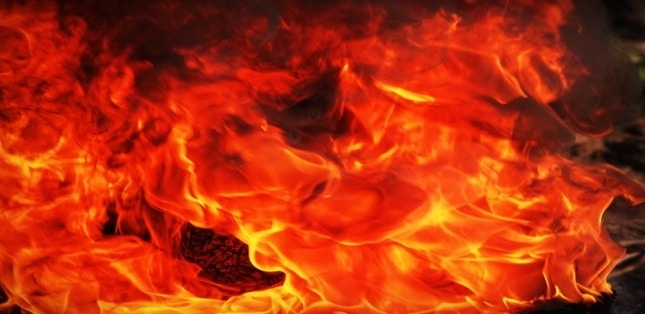The phrase “eternal fire” only occurs three times in the entire Bible in English in the NASB, ESV, ISV, RSV. In the KJV and NKJV, it only occurs in Jude 7. The KJV and the NKJV use “everlasting fire” in Matt. 18:8; 25:41 for a total of three uses. In Greek, the phrase “eternal fire” consists of two words: “eternal” is αἰώνιος, aiōniŏs and “fire” is πῦρ, pur. “Eternal” occurs 71 times in the New Testament. “Fire” occurs 73 times. The combination of those who Greek words of “eternal fire” only occurs 3 verses: Matt. 18:8; 25:41; Jude 7.
In Matthew 18:8 and Jude 7 the punishment of the wicked is to suffer eternal fire. Of course, the conditionalists will say that the eternal fire that emanates from God eternally because God is a consuming fire (Heb. 12:29). But in Matthew 25:41 the accursed ones are cast into the eternal fire which “has been prepared for the devil and his angels.” If the eternal fire is something that emanates out of God because God is eternal, then the eternal fire was there forever in order to burn the devil and his angels. But that would not fit with the idea that God is a consuming fire.
- Greek phrase: αἰώνιος πῦρ, eternal fire (Greek: πυρ το αιωνιον)
- Meaning: eternal fire
- Strong’s #: G166 (eternal) & G4442 (fire)
Frequency: 3 occurrences
Summary of the meaning of the Greek phrase ‘eternal fire’ in all verses where it occurs in the New Testament.
- Representative, 3 occurrences
- Matt. 18:8; 25:41; Jude 7
| TABLE OF ALL NEW TESTAMENT USAGES OF ‘ETERNAL FIRE’, αἰώνιος and πῦρ | ||
| Address | Verse | Meaning |
| Matt. 18:8 | “If your hand or your foot causes you to stumble, cut it off and throw it from you; it is better for you to enter life crippled or lame, than to have two hands or two feet and be cast into the eternal fire.” (Greek: πυρ το αιωνιον, lit. ‘fire the eternal.’) | Punishment |
| Matt. 25:41 | “Then He will also say to those on His left, ‘Depart from Me, accursed ones, into the eternal fire which has been prepared for the devil and his angels;” (Greek: πυρ το αιωνιον, lit. ‘fire the eternal.’) | Representative |
| Jude 7 | “just as Sodom and Gomorrah and the cities around them, since they in the same way as these indulged in gross immorality and went after strange flesh, are exhibited as an example in undergoing the punishment of eternal fire.” (Greek: πυρος αιωνιου, lit. ‘fire of eternal’) | Representative |
Dictionaries and Lexicons consulted on Eternal, αἰώνιος
- “αἰώνιος aiṓnios; gen. aiōníou, masc.–fem., neut. aiṓnion, adj., also fem. aiōnía, neut. aiṓnion, from aiṓn (165), age. Eternal, perpetual, belonging to the aiṓn (165), to time in its duration, constant, abiding. When referring to eternal life, it means the life which is God’s, and hence it is not affected by the limitations of time. Aiṓnios is specially predicated of the saving blessings of divine revelation, denoting those things which are not transitory
- Zodhiates, Spiros. The Complete Word Study Dictionary: New Testament. Chattanooga, TN: AMG Publishers, 2000
- ‘pertaining to an unlimited duration of time—‘eternal.’ ἀί̈διος: ἥ τε ἀί̈διος αὐτοῦ δύναμις καὶ θειότης ‘his eternal power and divine nature’ Ro 1:20. αἰώνιος: βληθῆναι εἰς τὸ πῦρ τὸ αἰώνιον ‘be thrown into the eternal fire’ Mt 18:8; τοῦ αἰωνίου θεοῦ ‘of the eternal God’ Ro 16:26. The most frequent use of αἰώνιος in the NT is with ζωή ‘life,’ for example, ἵνα πᾶς ὁ πιστεύων ἐν αὐτῷ ἔχῃ ζωὴν αἰώνιον ‘so that everyone who believes in him may have eternal life’ Jn 3:15.
- Louw, Johannes P., and Eugene Albert Nida. Greek-English Lexicon of the New Testament: Based on Semantic Domains. New York: United Bible Societies, 1996.
- “αἰώνιος [aionios /ahee·o·nee·os/] adj. From 165; TDNT 1:208; TDNTA 31; GK 173; 71 occurrences; AV translates as “eternal” 42 times, “everlasting” 25 times, “the world began + 5550” twice, “since the world began + 5550” once, and “for ever” once. 1 without beginning and end, that which always has been and always will be. 2 without beginning. 3 without end, never to cease, everlasting. Additional Information: For synonyms see entry 126, aidos.See entry 5801 for comparison of synonyms.”
- Strong, James. Enhanced Strong’s Lexicon. Woodside Bible Fellowship, 1995.
Dictionaries and Lexicons consulted on Fire, πῦρ
- “Literal fire (Matt. 3:10, 12; 7:19; 13:40; 17:15; Mark 9:22; Luke 3:9, 17; 22:55; John 15:6; Acts 28:5; Heb. 11:34; James 3:5; 5:3; 1 Pet. 1:7; Rev. 3:18; 8:5, “upon the altar” (a.t.), Rev. 8:8; 9:17, 18; 11:5; 14:18; 15:2; 16:8; 17:16; 18:8; Sept.: Gen. 22:6, 7; Ex. 32:20). The gen. purós often takes the place of an adj. (Acts 7:30, “fiery flame” [a.t.]; Heb. 1:7; Rev. 1:14; 2:18; 19:12; Sept.: Is. 29:6).
- Zodhiates, Spiros. The Complete Word Study Dictionary: New Testament. Chattanooga, TN: AMG Publishers, 2000
- ‘πῦρ, ός n—‘fire.
- Louw, Johannes P., and Eugene Albert Nida. Greek-English Lexicon of the New Testament: Based on Semantic Domains. New York: United Bible Societies, 1996.
- πῦρ [pur /poor/] n n. A root word; TDNT 6:928; TDNTA 975; GK 4786; 74 occurrences; AV translates as “fire” 73 times, and “fiery” once. 1 fire.
- Strong, James. Enhanced Strong’s Lexicon. Woodside Bible Fellowship, 1995.
Return to Annihilationism Page





